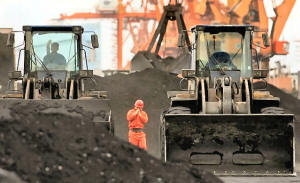|
Exclusive: Despite sanctions, North Korea
exported coal to South and Japan via Russia - intelligence sources
 Send a link to a friend
Send a link to a friend
 [January 26, 2018]
By Guy Faulconbridge, Jonathan Saul and Polina Nikolskaya [January 26, 2018]
By Guy Faulconbridge, Jonathan Saul and Polina Nikolskaya
PARIS/LONDON/MOSCOW (Reuters) - North Korea
shipped coal to Russia last year which was then delivered to South Korea
and Japan in a likely violation of U.N. sanctions, three Western
European intelligence sources said.
The U.N. Security Council banned North Korean exports of coal last Aug.
5 under sanctions intended to cut off an important source of the foreign
currency Pyongyang needs to fund its nuclear weapon and long-range
missile program.
But the secretive Communist state has at least three times since then
shipped coal to the Russian ports of Nakhodka and Kholmsk, where it was
unloaded at docks and reloaded onto ships that took it to South Korea or
Japan, the sources said.
A Western shipping source said separately that some of the cargoes
reached Japan and South Korea in October last year. A U.S. security
source also confirmed the coal trade via Russia and said it was
continuing.
"Russia's port of Nakhodka is becoming a transhipping hub for North
Korean coal," said one of the European security sources, who requested
anonymity because of the sensitivity of international diplomacy around
North Korea.

Russia's mission to the United Nations informed the Security Council
sanctions committee on Nov. 3 that Moscow was complying with the
sanctions.
"Russia does not buy coal from North Korea and is not a transit point
for coal deliveries to third countries," Interfax news agency on Friday
quoted an unidentified official at Russia's embassy to North Korea as
saying.
Two lawyers who specialize in sanctions law told Reuters it appeared the
transactions violated U.N. sanctions.
Reuters could not independently verify whether the coal unloaded at the
Russian docks was the same coal that was then shipped to South Korea and
Japan. Reuters also was unable to ascertain whether the owners of the
vessels that sailed from Russia to South Korea and Japan knew the origin
of the coal.
The U.S. Treasury on Wednesday put the owner of one of the ships, the
UAL Ji Bong 6, under sanctions for delivering North Korean coal to
Kholmsk on Sept. 5.
It was unclear which companies profited from the coal shipments.
RUSSIA URGED "DO MORE" ON SANCTIONS
North Korean coal exports were initially capped under a 2016 Security
Council resolution that required countries to report monthly imports of
coal from North Korea to the council's sanctions committee within 30
days of the end of each month.
Diplomats, speaking on condition of anonymity, said Russia had not
reported any imports of North Korea coal to the committee last year.
The sanctions committee told U.N. member states in November that a
violation occurs when "activities or transactions proscribed by Security
Council resolutions are undertaken or attempts are made to engage in
proscribed transactions, whether or not the transaction has been
completed."
Asked about the shipments identified by Reuters, Matthew Oresman, a
partner with law firm Pillsbury Winthrop Shaw Pittman who advises
companies on sanctions, said: "Based on these facts, there appears to be
a violation of the U.N. Security Council resolution by the parties
involved."

"Also those involved in arranging, financing, and carrying out the
shipments could likely face U.S. sanctions," he said.
Asked about the shipments, a U.S. State Department spokesman said: "It's
clear that Russia needs to do more. All U.N. member states, including
Russia, are required to implement sanctions resolutions in good faith
and we expect them all to do so."
The White House did not immediately respond to a request for comment.
The independent panel of experts that reports to the Security Council on
violations of sanctions was not immediately available for comment.
North Korea has refused to give up the development of nuclear missiles
capable of hitting the United States. It has said the sanctions infringe
its sovereignty and accused the United States of wanting to isolate and
stifle North Korea.
An independent panel of experts reported to the Security Council on
Sept. 5 that North Korea had been "deliberately using indirect channels
to export prohibited commodities, evading sanctions."
Reuters reported last month that Russian tankers had supplied fuel to
North Korea at sea and U.S. President Donald Trump told Reuters in an
interview on Jan. 17 that Russia was helping Pyongyang get supplies in
violation of the sanctions.
The U.S. Treasury on Wednesday imposed sanctions on nine entities, 16
people and six North Korean ships it accused of helping the weapons
programs.
TWO ROUTES
Two separate routes for the coal were identified by the Western security
sources.
[to top of second column]
|

An employee walks between front-end loaders which are used to move
coal imported from North Korea at Dandong port in the Chinese border
city of Dandong, Liaoning province December 7, 2010.
REUTERS/Stringer/File Photo

The first used vessels from North Korea via Nakhodka, about 85 km
(53 miles) east of the Russian city of Vladivostok.
One vessel that used this route was the Palau-flagged Jian Fu which
Russian port control documents show delivered 17,415 tonnes of coal
after sailing from Nampo in North Korea on Aug. 3 and docking at
berth no. 4 run by LLC Port Livadiya in Nakhodka. It left the port
on Aug. 18.
The vessel had turned off its tracking transmitter from July 24 to
Aug. 2, when it was in open seas, according to publicly available
ship tracking data. Under maritime conventions, this is acceptable
practice at the discretion of the ship's captain, but means the
vessel could not be tracked publicly.
Another ship arrived at the same berth -- No. 4 -- on Aug. 16,
loaded 20,500 tonnes of coal and headed to the South Korean port of
Ulsan in Aug. 24, according to Russian port control documents.
Reuters was unable to reach the operator of the Jian Fu, which was
listed in shipping directories as the China-based Sunrise Ship
Management. The Nakhodka-based transport agent of the Jian Fu did
not respond to written and telephone requests for comment. LLC Port
Livadiya did not respond to a written request for comment.
The second route took coal via Kholmsk on the Russian Pacific island
of Sakhalin, north of Japan.
At least two North Korean vessels unloaded coal at a dock in Kholmsk
port in August and September after arriving from the ports of Wonsan
and Taean in North Korea, Russian port control data and ship
tracking data showed.
The Rung Ra 2 docked in Kholmsk three times between Aug 1 and Sept.
12, unloading a total of 15,542 tonnes of coal, while the Ul Ji Bong
6 unloaded a total of 10,068 tonnes of coal on two separate port
calls -- on Aug. 3 and between Sept. 1 and Sept. 8, according to the
official Russian Information System for State Port Control.

The coal did not pass Russian customs because of the UN sanctions
taking effect, but was then loaded at the same dock onto
Chinese-operated vessels. Those vessels stated their destination in
Russian port control documents as North Korea, according to a source
in Sakhalin port administration who spoke on condition of anonymity.
Reuters has seen the port control documents which state the
destination of the coal as North Korea. But the vessels that loaded
the North Korean coal sailed instead for the ports of Pohang and
Incheon in South Korea, ship tracking data showed.
In Beijing on Friday, foreign ministry spokeswoman Hua Chunying told
reporters she did not know anything about the situation but China
was clear in its hope that the UN resolutions are followed fully.
China will not allow any Chinese company or individual to do
anything that goes against the resolutions and if there is cast-iron
proof this is happening, China will handle it seriously and in
accordance with the law, she added.
The U.S. Treasury on Wednesday included the owner of the Ul Ji Bong
6 under sanctions for delivering North Korean coal to Kholmsk after
the sanctions took effect.
It was unclear which companies profited from the coal shipments.
Asked about the shipments, a South Korean foreign ministry official
said: "Our government is monitoring any sanctions-evading activities
by North Korea. We're working closely with the international
community for the implementation of the sanctions."
The official declined to say whether the ministry was aware of the
shipments reported by Reuters.
The Japanese foreign ministry did not immediately respond to a
request for comment.

The European security sources said the route via Russia had
developed as China, North Korea's neighbor and lone major ally,
cracked down on exports from the secretive Communist state.
"The Chinese have cracked down on coal exports from North Korea so
the smuggling route has developed and Russia is the transit point
for coal," one of the European security sources said.
(Writing by Guy Faulconbridge and Jonathan Saul; Additional
reporting by Michele Nichols in New York, Oksana Kobzeva and Gleb
Stolyarov in Moscow, Hyonhee Shin in Seoul, William James in London,
Muyu Xu, Ben Blanchard and Josephine Mason in Beijing, Aaron
Sheldrick and Linda Sieg in Tokyo, and Mark Hosenball and Matt
Spetalnick in Washington; Editing by Timothy Heritage and Clarence
Fernandez)
[© 2018 Thomson Reuters. All rights
reserved.]
Copyright 2018 Reuters. All rights reserved. This material may not be published,
broadcast, rewritten or redistributed.
Thompson Reuters is solely responsible for this content. |